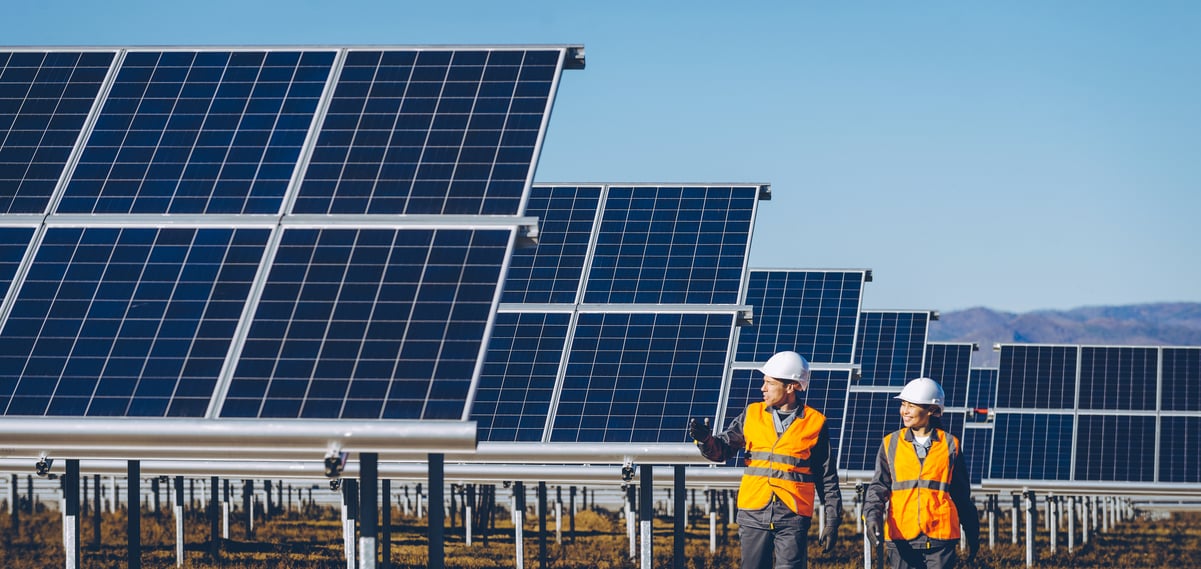The solar industry is going to have a tumultuous year, and there may not be many winners to choose from. A report by the Department of Labor said that 106,000 clean energy workers lost their jobs in March, and a big chunk of those were likely in the solar industry, showing just how quickly the industry can be affected by an economic downturn.
With current social restrictions, small installers will have a hard time selling residential solar door-to-door, and large solar developers may have projects pushed back because electricity demand has plunged during the COVID-19 pandemic. Then there are manufacturing shutdowns across the world that will affect nearly every manufacturer.
Amid all of the challenges, though, there's one company built to survive and thrive, and that's First Solar (FSLR +0.04%).

Image source: First Solar.
Where First Solar stands today
After a few years of strategic changes that sold off solar asset ownership and shut down most engineering and procurement activities, First Solar is fully focused on manufacturing thin-film solar panels.
Those thin-film solar panels aren't the most efficient panels out there -- they're 18.2% efficient at turning the sun's energy into electricity, while industry leaders can reach 22% or more -- but they're more effective in other ways. Thin-film panels perform better in heat, high humidity, and even handle dirt and debris better than traditional silicon-based solar panels. This makes First Solar's product cost-competitive in the utility-scale market it serves.
What makes First Solar profitable is the fact that it has low costs and scale that few competitors can match. The company had 6 gigawatts (GW) of capacity at the end of 2019, and that'll grow to 8.0 GW at the end of 2021 as it upgrades plants to its Series 6 production process.
Cash is a strength
There aren't many companies with enough cash on their balance sheets to cover multiple years of operating expenses if we're in for a prolonged downturn, but that's what First Solar has. It had $1.8 billion in net cash on its balance sheet at the end of 2019, and management expected operating expenses to be $340 million to $360 million in 2020. That's plenty of cash to get the company through the current crisis.
A solid balance sheet also allows First Solar to acquire competitors if it so chooses. The company has unwound some of its previous vertical integration strategies, but it could acquire competitors who make products that compete in markets it doesn't serve, such as residential and commercial rooftop solar. This could diversify First Solar's business and provide growth at the same time.
First Solar's risk
As strong as First Solar is today, there are some risks facing the company. In the highly competitive solar industry, competitors who make commodity solar panels have typically been able to lower prices and costs rapidly during times of weak demand. That's cut First Solar's revenue per watt and caused gross margin to shrink by about half (and at times more) over the past decade.
The other risk is that global solar installations fall rapidly in 2020 and 2021 as utilities plan for a prolonged reduction in demand for electricity. That could shrink the company's market opportunity over the long term and cause solar panel manufacturers to fight even harder for the market that's left.
Is First Solar a buy?
I think First Solar is one of the few renewable energy stocks built to endure in the current economic and energy environment. It has 12.4 GW of bookings for future solar panel deliveries, a great balance sheet, and solid technology that's improving every year.
There are certainly risks facing the company and the industry overall, but right now, the long-term opportunity outweighs that risk.






